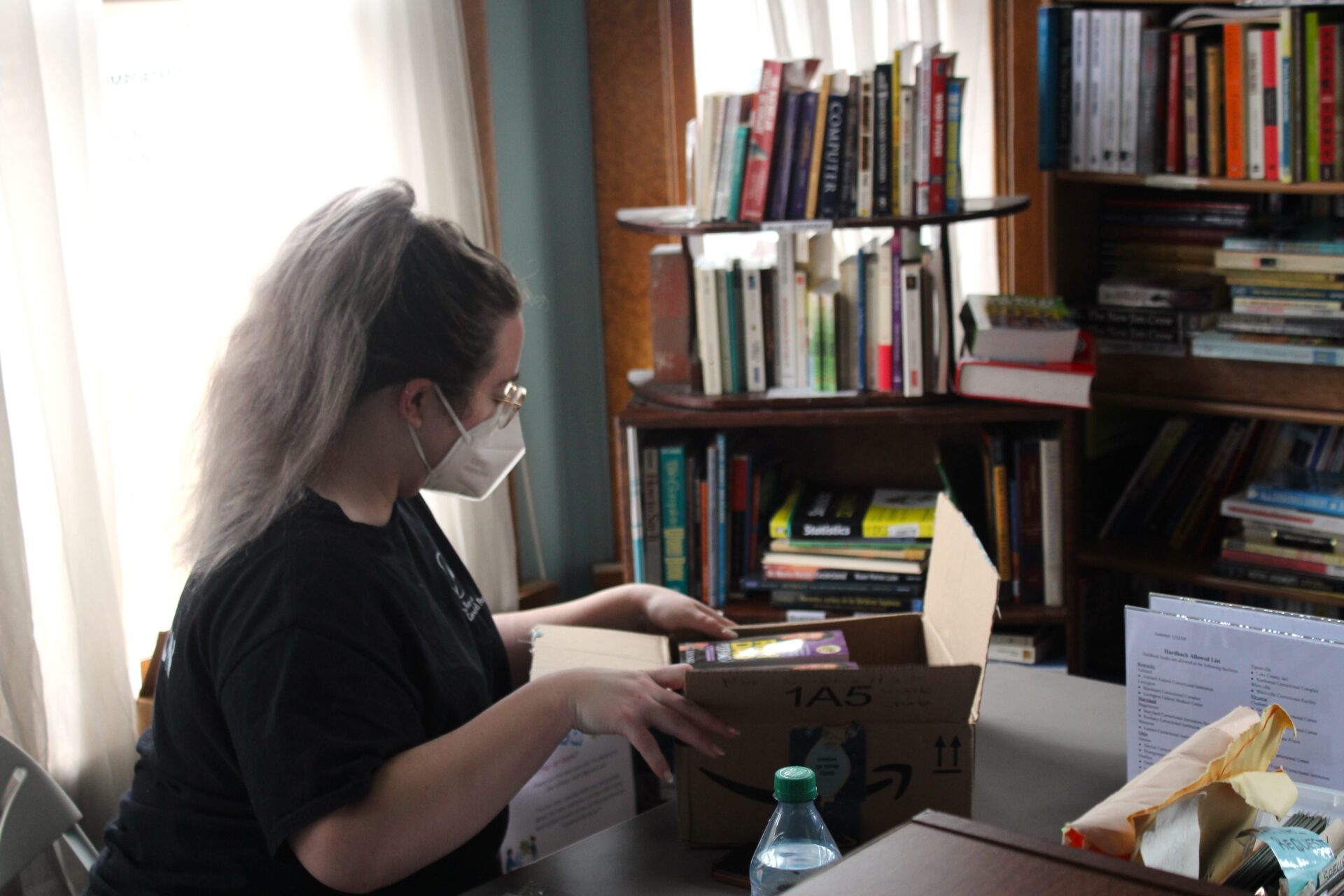Each week, volunteers comb through a stack of more than 200 letters on the second floor of the Aull Center, a historic twentieth-century home in Monongalia County now owned by the Morgantown Public Library.
Sent by people incarcerated across Appalachia, most of these letters contain the same request: a new book to read.
Some prisons in the United States have their own libraries, but often with narrow inventories and limited hours of operation. In turn, more than 50 organizations across the United States and Canada mail incarcerated people books missing from their library shelves.
In West Virginia, one nonprofit — the Appalachian Prison Book Project (APBP) — has distributed books throughout the region since 2004. In that twenty year span, APBP has mailed more than 70,000 books, according to Communications Coordinator Lydia Welker.
People in Appalachian prisons can submit written letters to APBP, requesting books they would like to receive through the mail, Welker said. APBP then examines each prison’s policies and connects readers with the book they requested, or one from a similar genre or subject area.
Volunteers join the project from all different backgrounds. Some are advocates for prison reform. Others, like Morgantown High School student Lilly Staples, do it from a love of books and desire to expand reading access.
Photo Credit: Chris Schulz/West Virginia Public Broadcasting
“It’s a really nice space for volunteer hours,” Staples said while volunteering at the Aull Center in April. “I’ve always loved to read, and so helping, giving other people that chance in their position really means something to me.”
Still, this work can be tricky. Books with divisive or controversial content — like violence and nudity — tend to be rejected outright by facility staff.
Other rules are subjective, changing from facility to facility. Welker said one prison even refused to take in a copy of The Lord of the Rings because it had illustrations of a fictional map.
“These rules are not set in stone,” Welker said. “It’s up to the discretion of whoever’s working in the mailroom or whatever prison system it is to decide if a book gets inside.”
Occasionally, books APBP sends are rejected by prison staff. APBP keeps a running list of which books are accepted at which facility to ensure that resources are not wasted.
Welker said APBP’s most common request is a dictionary. Other widely sought-after texts include textbooks, as well as books that contain medical or legal information.
Photo Credit: Chris Schulz/West Virginia Public Broadcasting
For the staff at APBP, this only further exemplifies the gaps in educational resources available to people who are incarcerated.
“It goes to show how much people need access to the outside world,” she said. “Very literally, information about how this world works.”
Mass incarceration in the United States often cuts people off from books and educational resources, which makes the work of APBP and similar prison book projects important, Welker said.
In 2022, the U.S. Bureau of Justice Statistics reported that 355 of every 100,000 U.S. residents were incarcerated — one of the highest rates globally.
Additionally, the national incarceration rate of Black residents was nearly five times the incarceration rate of white residents in 2022. Hispanic residents were also incarcerated at nearly double the rate of white residents nationally.
Without groups like APBP, thousands of residents — and a disproportionate number of Black residents — would lack access to reading resources.
For many staff members and volunteers, working with APBP has opened their eyes to realities like these, and the daily challenges that incarcerated people face across the United States.
Before joining APBP, mass incarceration in the United States “was never really something that seemed really direct to me,” said Danielle Stoneberg,
“It was never really something that seemed really direct to me, and kind of in my face,” Danielle Stoneberg, prison outreach coordinator, said.
Photo Credit: Chris Schulz/West Virginia Public Broadcasting.
“As I started to have these experiences of going inside and reading letters, and also just having conversations with people, … I started to realize that I have a lot more friends than I thought, who had loved ones who have been impacted by the system,” she said.
Stoneberg said prison book projects like APBP allow volunteers to acknowledge the humanity of people who are incarcerated and work to improve their lived experiences.
“Many of us who work here with APBP, we believe that individuals shouldn’t be judged for the mistake that they made. We wouldn’t want to be judged for the worst thing that we ever did,” she said. “That’s why I sit on the phone for 20, 30 minutes on hold with a prison just to get hung up on, or not get the answer that I want.”
Stoneberg said this work is an important step toward making a difference in the U.S. prison system. Now, she is encouraging others to get involved in the project, too.
“What I would tell people is go ahead and have these experiences,” she said. “See if that makes you believe in the humanity of people who are incarcerated.”
For more information on the Appalachian Prison Book Project, visit the project’s website.
Chris Schulz contributed reporting to this story.
